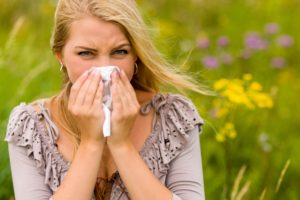Spring is just around the corner. Sunny blue skies and the crisp, fresh air outside beckons. It is a beautiful time to be outdoors, watch the kids play and enjoy Mother Nature’s renewal. But for many, Spring is also the time of suffering from seasonal allergies.
 Allergic rhinitis or hay fever affects about 60 million people in the United States, including children and adults. The immune system overreacts to pollen grains that enter the nose and causes inflammation, resulting in familiar symptoms such as sneezing, sniffling and watery, itchy eyes. In the Spring, the culprit is usually tree pollen, and in Denton County, those trees include oak, ash, pecan, hackberry, maple, mountain cedar, juniper and mulberry to name just a few.
Allergic rhinitis or hay fever affects about 60 million people in the United States, including children and adults. The immune system overreacts to pollen grains that enter the nose and causes inflammation, resulting in familiar symptoms such as sneezing, sniffling and watery, itchy eyes. In the Spring, the culprit is usually tree pollen, and in Denton County, those trees include oak, ash, pecan, hackberry, maple, mountain cedar, juniper and mulberry to name just a few.
Last years allergy season was bad and this year appears to be the same. Almost 1/3 of the U.S. is already at moderate to high pollen levels. Our winter was warmer than usual and we had more rain, which makes for a longer tree and grass season with pollen arriving earlier and staying later. Spring allergy season has been starting about two weeks earlier over the past several decades. Add global warming and increased carbon dioxide production to the picture and pollen production can increase and allergies may worsen.
Don’t despair
There are ways to decrease your symptoms, mainly through avoidance, medications and allergen immunotherapy. Avoidance of tree and mold pollens can be helpful for spring allergies, this may involve staying indoors or wearing a mask if you are outside. Shower after being outdoors and bathe pets that have been outside. Dry, sunny, windy days may kick up pollen in the air and rainy days may decrease pollen in the air. Medications that may help include over the counter antihistamines, nasal steroid sprays and prescription medication from your allergist. It is important to start these medications several weeks before onset of allergy season and to be consistent with the medications.
Immunotherapy includes allergy shots, drops or tablets. Allergy shots “immunize” the body like a vaccine, decreasing sensitivity to allergens by injecting increasing amounts of the agents a person is allergic to. This process provides lasting relief of allergy symptoms for years even after treatment is stopped.
If you suffer from seasonal allergies, it’s best to see an allergist to figure out what you are allergic to and how best to tackle your symptoms. Come visit us at North Texas Allergy & Asthma Center and our Board-Certified Allergists can help you feel better!
For further reading: This article or this article
ROSHNI FOSTER, MD, PHD
Board Certified Allergist







